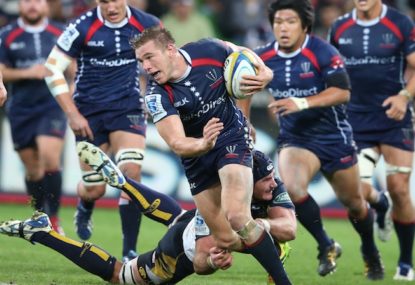Captain Pugwash
new author
Roar Rookie

I’m sure we are all well aware of the changes that are going to take place in Super Rugby in 2016. I, for one, am not happy with them.
The introduction of three new teams into the competition won’t only have the affect of diluting the standard of the competition and adding onto an already massive travel schedule, but it will also have a knock on effect on the international season.
There have already been several attempts of expanding the competition, none of which have entirely successful. In 2006, the competition expanded from Super 12 to Super 14, with the inclusion of two new teams.
The Western Force from Perth and the Cheetahs (Cats), who were to draw their players from the Free State and Northern Cape provinces.
Both of these teams have been a relative failure since being introduced. The Force have averaged 11th on the table since 2006, with zero appearances in the playoffs. The Force surprised many this year, just missing out on the finals, but one can’t be blamed for being sceptical about them repeating it again next year.
The Cheetahs have fared only slightly better. Also averaging 11th on the table, they have two appearances in the play offs, both times losing in the opening round.
The Melbourne Rebels were the last team to be introduced, creating Super Rugby. They have been abysmal, averaging 14th on the table with no appearances in the play offs. In the first couple of years they were forgiven for their poor performances, you can’t expect much from a team that’s never played together before, but they’ve had four seasons now with no improvement.
Therefore, the expansion to 18 teams in 2016 is insane. Adding another South African team, the Kings, will only see a repeat of what happened to them in 2014.
They will be the whipping boys of the competition. They will without a doubt finish at or around the bottom of the table. South Africa struggle to field three quality teams, let alone six. The Kings will join the Cheetahs and Lions at the bottom of the table.
The inclusion of an Argentine team is even more baffling. They too will struggle to field a quality team that can compete. This isn’t the biggest problem though. The travel factor is the biggest problem.
Players, particularly South African players who have to travel to both Australia and New Zealand, will now have to travel to Argentina as well.
How are players supposed to recover properly if they are in a plane half the time? This is ridiculous. Considering the standard of Argentine rugby, particularly with their best players in Europe, this type of travel is not worth it.
This won’t only have knock on affect on rest of the competition. As teams struggle to work around this ridiculous travel schedule, players won’t have the time recover properly for the June Internationals and the Rugby Championship. The November tour would also feel the affect.
The best way from Argentina to play this, is for them to try and get a majority of their players Super Rugby contracts, or get a majority of them playing in Europe. Having an Argentine team would be a massive detriment to the competition and the international rugby that comes after it.
The same can be said for Japan. It’s simply not worth it. They will bring nothing to the competition apart from inconvenience and a bonus-point try for the teams that play them.
Now, if I’m going to criticise the new format, I have to provide an alternative. My alternative is to either keep the competition how it is, or have an ITM cup style tournament, with two separate tables and kick out the Rebels, so there are two tables of seven. Or, keep the Rebels, add the Kings to keep the South African’s happy and have two tables of eight.
Equivalent of the premiership table
1. Crusaders
2. Waratahs
3. Sharks
4. Chiefs
5. Brumbies
6. Bulls
7. Highlanders
8. Reds/Hurricanes
Equivalent of the championship table
1. Reds/Hurricanes
2. Stormers
3. Blues
4. Force
5. Cheetahs
6. Lions
7. Rebels
8. Kings
Having a format like this would generate a larger interest in the game, particularly from supporters of the lower ranked teams, for several reasons.
Firstly, more teams are going to be included in play off matches. Teams that regularly finish 8-12th will no longer be sitting out the final part of the season, they will be playing in the semi-finals and finals, fans won’t have to be content with watching the Crusaders, Brumbies, Chiefs, and Waratahs battle it out again.
They can support their team in the finals and experience the excitement of them being promoted to the Premiership table. Add something like the Ranfurly Shield in, and it will actually create excitement. Ranfurly Shield matches are some of the best in the ITM cup, my team never plays in them and I still get excited.
We would still experience the high tempo and high quality nature of Super Rugby that we’ve all come to love, but this will add another level to it.
Add in the fact that the tables will be constantly changing with say, the bottom two teams being relegated and the top two teams of the Championship table being promoted, new teams will get a chance to get to the top every season.
This won’t stop the dominance of the top teams, but it will add something new without the inclusion of more sub standard teams and a ridiculous travel factor.
In conclusion, the addition of an Argentine team and a Japanese team will only serve to weaken Southern Hemisphere rugby.
Only Japan and Argentina benefit from this. South Africa, Australia, and New Zealand gain nothing, or, it will have a detrimental affect on their rugby. What I have proposed above, or something similar, will increase interest in the game while keeping the high standard of tri-nations rugby.